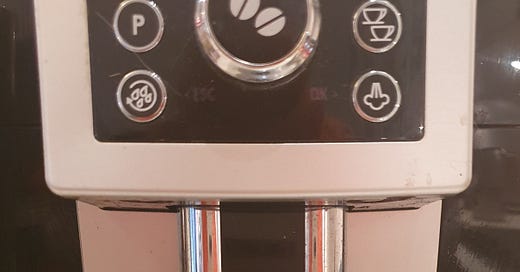Full disclaimer: I love robots. Our household contains a few, from an automatic vacuum, which terrifies our cats, to other helpers, all cherished members of the family and yes, I give them names.
(Meet Giovanni, our in-house coffee expert)
So, recent artificial intelligence developments in creative work have perked up my ears. I’m already using AI like ProWriting Aid and AutoCrit to polish my grammar and storytelling, but could there be more in this bag of goodies?
Roald Dahl’s ‘The Great Automatic Grammatizator’, for example, features a machine that can churn out a prize-winning novel in a matter of minutes. If you know Dahl’s stories, you’ll know their dark undertones pose interesting questions. Some of these questions are on our lips today, namely will artificial intelligence put creators out of their work?
Many fear so, and it’s great to see visionary indie authors like Joanna Penn offer informed and balanced views on the topic.
As for me, I love the idea of using AI as a marketing assistant, a brainstorming board and sometimes a welcome partner in procrastination, but will I ever task it with writing my next book or even designing a cover? No, absolutely not.
I’ve had my fun with ChatGPT, asking it to produce cake recipes, story plots and marketing materials. My verdict? Yes to recipes, travel plans and blurbs, a hard pass for all the rest. The plots ChatGPT suggested were too simplistic and unimaginative and though I’m sure it’ll get better at it, I relish the challenge of creating devilish storylines that surprise the reader.
A fun fact: I asked ChatGPT to provide a culinary mystery plot featuring AI, mostly curious if it would cast itself as a villain or a hero. It did neither. Smartly, the AI cast itself as a sidekick to the detective. While I didn’t like the sound of any of the offered plots, the mere process of asking the question landed me a great idea for a short story, which will be included in my next short story collection, hopefully released later this year.
Now, I don’t doubt that ChatGPT can write semi-accurate yet interesting articles, research papers and novels in a matter of minutes. I’m also sure using it to write an early draft would save me tonnes of time (think 10 min instead of three months), but I’m not going to use it and here’s why.
I’m a writer because I love writing. That messy, often frustrating process of creating the first draft is me telling the story to myself. It means reaching deep into the murky pool of my subconscious, stir it and see what comes out. Sure, I could nudge Chat GPT in the right direction with prompts and details, and yes, it would probably produce a plausible story. It just wouldn’t be my story.
Every writer has their own rewards. For me, it’s the process of creation, not the finished product. Yup, the drafting and polishing, the assembling and breaking of the story in all its messy glory. That’s something I’m not willing to part with.
Lastly, I love reading and writing stories that stir emotions. Now, AI might be almighty and faster than anyone else, but it can’t feel. And I’d much rather keep creative control over my stories, than fiddle around, trying to fix an AI produced draft.
In my humble opinion, the human element in storytelling is essential. I’m sure many might use, or already have used, AI writing tools to produce a story in the style of a famous best-selling author, say someone like Stephen King.
Now, I adore Stephen King’s writing, but not because of his style. It’s because Stephen King knows how to reach into that deep basin of fears and demons and tease out the shadows.
Beat that, ChatGPT.




